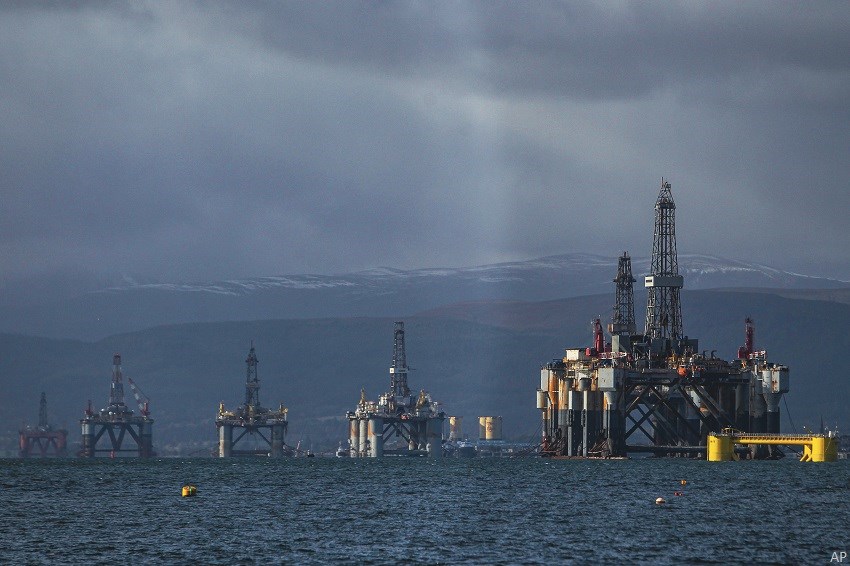
For the first time in history, all sectors in the S&P 500 clocked double-digit gains last year, with the benchmark index ending the year with a 27% return. But energy stood out, bouncing back from a 2020 rout with 40% gains.
In a similar story north of the border, a resurgence in energy stocks underpinned the impressive 22% rise in the S&P/TSX Composite Index for 2021 - its best year since 2009.
It’s little surprise that energy stocks made up the bulk of the top-performing stocks globally on both benchmarks. These three U.S. energy names are among the elite group of stocks that made the highest gains in 2021, and will likely continue to benefit from rising oil prices.
|
Devon Energy Corp |
||
|
Ticker |
||
|
Current yield: |
1% |
|
|
Forward P/E: |
8.64 |
|
|
Price |
US$44.05 |
|
|
Fair value: |
US$45 |
|
|
Value |
Fairly valued |
|
|
Moat |
None |
|
|
Moat Trend |
Stable |
|
|
Star rating |
*** |
|
|
Data as of Jan 03, 2021 |
||
Devon Energy (DVN) is a U.S. oil and gas producer with assets in several shale basins, including the Delaware Basin, Eagle Ford Shale, STACK, and Powder River Basin. Oil and natural gas liquids make up 70% of its production, while natural gas accounts for the rest.
With a 176.2% gain in 2021, Devon was the third-best performing stock of the year.
Devon has been aggressively divesting non-performing assets and businesses while making strategic acquisitions, including the merger with Oklahoma-based shale firm, WPX Energy. The move significantly expanded Devon’s Delaware Basin exposure and added a small position in the core of the Bakken Shale fairway in North Dakota.
“The merger will enhance the competitiveness of the combined firm through enhanced economies of scale and more efficient field operations,” says a Morningstar equity report, but adds that these improvements to boost returns are not enough to support an economic moat rating.
The Delaware Basin offers the best development economics in Devon’s portfolio and will be the primary growth engine for the company going forward.
“How fast firmwide production grows will depend on the trajectory of commodity prices, to an extent,” says Morningstar sector director Dave Meats, adding that management has pledged to keep growth at 5% or less, even during upcycles.
The firm plans to restrict cash flow expenditure to no more than 70%-80% under any circumstances, “which means any windfall during periods of higher prices will be returned to shareholders rather than plowed back into new drilling,” says Meats, who puts the stock’s fair value at US$45, based on the assumption that WTI oil prices in 2021 and 2022 will average $69/bbl and $76/bbl, respectively.
|
Continental Resources Inc |
||
|
Ticker |
||
|
Current yield: |
1.79% |
|
|
Forward P/E: |
7.30 |
|
|
Price |
US$44.76 |
|
|
Fair value: |
US$51 |
|
|
Value |
Fairly valued |
|
|
Moat |
None |
|
|
Moat Trend |
Stable |
|
|
Star rating |
*** |
|
|
Data as of Jan 03, 2021 |
||
U.S. oil and gas producer Continental Resources (CLR) has operations in the Bakken Shale in North Dakota, the Delaware Basin in Texas, and the Scoop/Stack plays in Oklahoma. Oil accounts for 54% of net production while natural gas and NGLs make up the rest.
With a 173.7% gain in 2021, this was the fourth-best performing stock of the year.
The firm is regarded as a key player in the early development of the Bakken Shale in North Dakota's Williston Basin, which contains almost half of its current proven reserves. “The company has demonstrated success with optimized completions over a wide area, and the average performance of its wells in the play has been holding steady recently,” says a Morningstar equity report.
Given that these wells are relatively cheap on a cost-per-foot basis, and since Continental boasts lower unit costs than most upstream peers, the economics are extremely competitive, the report adds.
Continental’s portfolio contains a sizable position in Oklahoma, its backyard, where it still holds more than 250,000 net acres. “The firm is currently focusing on Project Springboard, a 45,000-acre project that will contain several hundred oil-weighted wells yielding 1.5 million barrels of oil equivalent each, when complete,” says Meats.
At the same time, the firm is ratcheting up the development of many other mega-projects in the same "Springboard" family.
The company doesn’t earn a moat, unlike its upstream peers, but it has a strong record in generating excess returns, having consistently earned its cost of capital during the “golden years” of the shale revolution, from 2009 until 2014.
However, Continental makes up for any weakness in pricing with extremely competitive unit expenses (among the lowest in Morningstar coverage). “Therefore, even though Continental's unit revenue is typically lower, its profitability still rivals the best Permian producers,” asserts Meats, who pegs the stock’s fair value at US$51.
|
Marathon Oil Corp |
||
|
Ticker |
||
|
Current yield: |
1.46% |
|
|
Forward P/E: |
9.40 |
|
|
Price |
US$16.42 |
|
|
Fair value: |
US$19 |
|
|
Value |
14% Discount |
|
|
Moat |
None |
|
|
Moat Trend |
Stable |
|
|
Star rating |
**** |
|
|
Data as of Jan 03, 2021 |
||
Marathon (MRO) is an independent exploration and production company mainly focused on unconventional resources in the U.S. Net production is split between oil and natural gas liquids (67%) and natural gas (33%).
With a 145.1% gain in 2021, this was the sixth-best performing stock of the year.
Marathon has painstakingly rejigged its portfolio over the past five to 10 years, shedding conventional projects and doubling down on U.S. shale.
“The firm has a dominant position in the Bakken and Eagle Ford plays, which together comprise over half of its current production,” says a Morningstar equity report.
In both plays, Marathon has substantial acreage in the "sweet spots," which are characterized by exceptionally strong initial production rates. However, not all of its acreage is located in these so-called sweet spots. “The rest yields more pedestrian flow rates, which translates to weaker margins and higher break-evens,” the report cautions.
The firm’s exposure to potential environmental, social, and governance issues could further hamper its ability to earn economic profits, it notes.
Elsewhere, the firm is still just getting started. In the Permian Basin, which it entered in 2017, it is ramping quickly from a very low base of production. “Well results thus far have been reasonably impressive, and are consistent with a West Texas Intermediate break-even level under US$40 per barrel (comparable to, but not significantly better than, what other Permian producers typically achieve),” says Meats, who appraises the stock’s fair value to be US$19.
Overall, Marathon earns no moat, which indicates strong returns on invested capital are likely to elude Marathon in the next few years.
However, “the unconventional side of the portfolio is capable of generating strong returns and could justify a moat if prior spending on non-shale assets were to be ignored,” notes Meats.




















